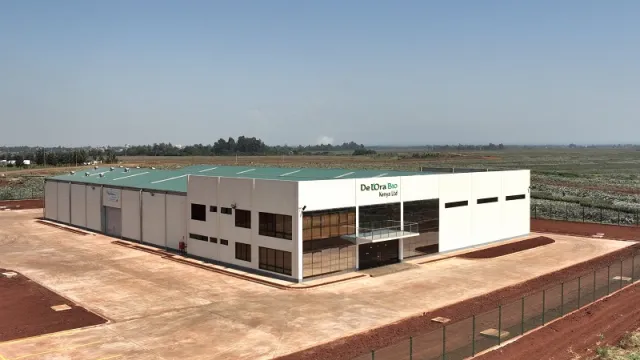Pineapple farming is on an upward trajectory but still requires significant support to drive growth

Pineapple farming is on an upward trajectory but still requires significant support to drive growth
How do you prefer your pineapple? Fresh, canned slices, or a refreshing glass of pineapple juice? If you are in Kenya, chances are you're indulging in pineapples from Del Monte Kenya, the largest pineapple producer, marketer, and distributor in the country.
Pineapple farming has gained significant prominence in the agriculture sector over the past six decades, with over 4,706 hectares in production in 2023, making it an important cash crop and a top foreign exchange earner.
“Pineapple production is very significant to the economy of Kenya in terms of creating employment and foreign exchange,” a recent report titled The World Pineapple Production, published in the African Journal of Food, Agriculture, Nutrition and Development (AJFAND), a peer-reviewed scholarly journal reads in part.
This observation is corroborated by data from the Economic Survey 2024, which shows that pineapple products and other tropical fruits and beverages generated a staggering Sh3.3 billion in revenue for Kenya in 2023.
A bulk of this revenue can be attributed to Del Monte Kenya, a firm that has mastered the science of pineapple farming and exports 75,000 metric tonnes worth of goods or 3,800 truckloads every year, making it a significant exporter and employer in Kenya. This feat is also attributable to the company’s strategic investment in new and sustainable practices which has significantly bolstered its growth and competitiveness.
Innovative agricultural technologies
Del Monte Kenya has pioneered innovative agricultural technologies such as drones and advanced irrigation systems as well as the introduction of high-yielding pineapple varieties which have not only increased yields but have also inspired smaller farmers across Kenya to invest in pineapple growing.
There is also a gradual and deliberate paradigm shift from the traditional value addition where the by-products from pineapple processing, like the outer peels and core, are repurposed as animal feed in a more sustainable approach known as a circular economy. This approach actively seeks new ways to maximize waste of both the products and the materials in the value chain, including cartons and crop residues.
"We believe in sustainable agricultural practices and believe we can change and indeed contribute positively to how pineapple farming operations are carried out in the future. Our focus isn’t just business-centric but on practices that benefit everyone in the value chain while protecting and preserving the environment for future generations,” said Wayne Cook, Del Monte Kenya’s Managing Director while referencing their biofertilizer plant, which exemplifies their commitment to environmental stewardship and cements Del Monte’s role as a leader in innovation and sustainability. Formulation development and application trials are in progress at the new plant which will convert pineapple byproducts for use as biofertilizer.
The implementation of these innovative practices creates more jobs, more opportunities, and more sustainable ways of operating. This benefits the local community and farmers directly and indirectly, resulting in a ripple effect on the local economy and positively transforming hundreds of thousands of livelihoods across the country.
“Expansion of pineapple production systems will therefore lead to more benefits to the economy of Kenya,” noted The World Pineapple Production’ journal.
An industry report by Mordor Intelligence highlights the immense opportunities in the global market attributed to the increasing demand for pineapples, growing consumer awareness, and rising private sector investments.
Pineapple plantation in Thika, Kenya. Del Monte Kenya, a firm that has mastered the science of pineapple farming, exports approximately 75,000 metric tonnes worth of fruit products every year, making it a key exporter and employer in Kenya. (Photo/Del Monte)
Read also: From Thika to the world: Kenyan town spreading pineapple cheer to the world
Sustainable practices
Granted, significant investments have gone into the local industry for improving infrastructure and sustainable practices to boost productivity, but these need to be tempered with building capacity of other players in the value chain. This can entail providing training on best practices and market trends.
Taking a holistic outlook is particularly crucial for the local sub-sector to compete favourably on the international stage which is dominated by exports from Costa Rica, the Philippines, and Ecuador. It would also enable the country to capture a bigger share of the global pineapple market, which is valued at an estimated USD28.79 billion in 2024 and is projected to reach USD 39.13 billion by 2029.
This task of increasing the global market share should not, however, be the sole responsibility of the private sector. It behooves the government, and indeed the wider African region, to formulate favourable policies and create conducive business environments.
This will enable growers to continue enhancing their efforts in creating and maintaining workplaces that are just and equitable, characterized by fair and competitive wages and safe working conditions, which would in turn support them to generate more revenue and taxes from the crop, ultimately transforming more lives.
This will enable Kenya and the rest of Africa to effectively enhance their production to reach the levels of the Asia-Pacific region, which produces more than 13 million metric tonnes.



